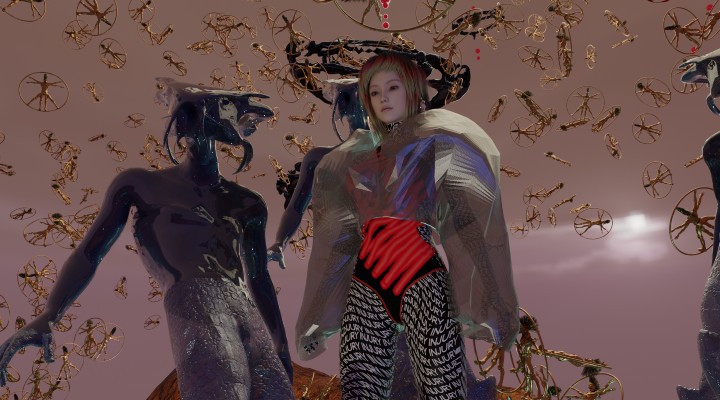Sydney-based fashion label Injury is set to launch Australia’s first digital fashion non-fungible token (NFT) art series. The unique three-piece range, Extended Dreams, has been developed in collaboration with CG visual art and music collective Real Parent and will be available for purchase in early February via NFT creative agency Culture Vault. Inspired by the ACG (anime, comic and gaming) subculture, the digital fashion items are extremely rare and upon purchase, the owners will
ill have the option to request metaverse-compatible digital files for use in the Injury metaverse community, which Injury and Real Parent are building.
In 2004, Eugene Leung started the Injury label, initially releasing 10 limited-edition screen-printed tops followed by an official menswear range, which launched during Mercedes-Benz Fashion Week Australia. He sold his first collection to Incu, an Australian fashion and lifestyle retailer.
From that point, Injury has experienced continuous growth and international distribution. It is most popular in Japan, Hong Kong, Korea, Thailand, Taiwan, and Singapore. According to the brand, it sits comfortably within underground fashion, representing ‘a state of mind, inspired by wandering through global subculture, with an unmistakable sense of identity’.
At Afterpay Australian Fashion Week in Sydney last year, Injury debuted a fashion film produced entirely in CGI titled The Butterfly’s Dream. At the same time, the progressive label released a digital fashion metawear collection on digital fashion marketplace DressX.
Injury’s foray into digital fashion is a welcome sign this area is gaining momentum quickly. The label is finding its own unmistakable sense of identity in the depths of online subcultures. It is these pockets of style and experimentation that blur the lines between being the person we dream of being and creating that identity online.
Physical to digital
The pandemic has changed industries and businesses all over the world and Leung’s experience has been no different. A multi-disciplined artist, musician, fashion visionary and digital explorer, Leung has pivoted the brand to focus on 3D fashion.
Set against a fantasy world, Injury’s genderless 2021/22 digital collection was based on a story about a group of hedonist characters trying to escape reality, eager to access an imaginary world.
Digital fashion is defining a modern era of identity and representation online. Rather than being a separate category, its intangible threads are woven deep into the psychology of fashion and identity. For many people, their online identity and the spaces they interact in are a more authentic reflection of how they see themselves than the reality they know living within societal constructs bound by inflexible labels. Digital fashion has the ability to break down moulds and traditions, enabling any person the freedom to express themselves authentically.
Utility NFTs
Popular NFT marketplace OpenSea reported sales reaching $3.5 billion in the middle of January 2022 alone. It was a record month, overtaking August 2021, when sales reached $3.4 billion. The NFT space is continuously making headlines all over the world.
Utility NFTs account for a large portion of those sales. They provide greater applications for use than collectables and are the second most popular type of NFT purchase, after collectables. Utility NFTs can unlock benefits for the owner, such as the ability to change digital fashion outfits between virtual worlds, access exclusive communities, share special rewards with NFT owners, and gain entry into the first NFT restaurant – the Flyfish Club, set to open in New York in 2023.
At the end of 2021, utility NFTs expanded into buying land and real estate in virtual environments. Virtual worlds such as Decentraland, Sandbox, and Infiniverse enable people and businesses to buy plots of digital land and buildings. There is currently an Australian Open experience in Decentraland for anyone to join.
The NFT market appears to be high risk and unstable. However, utility NFTs, which offer practical benefits and interesting experiences, will stabilise as practical uses find their way into business strategies; for example, offering a unique and verifiable token as part of a membership, club, or virtual world.
There is a huge opportunity for various types of businesses to explore utility NFTs. Particularly in retail and e-commerce, where providing additional value is not only a marketing tactic, it’s something customers expect.
For Injury, the long game is to build a virtual world where loyal fans can interact and use rare NFTs. Expect more surreal designs underpinned by fantastical stories and artifacts, which will no doubt increase in value.
Brands need to evolve now to be provide goods and services to customers in virtual environments.

